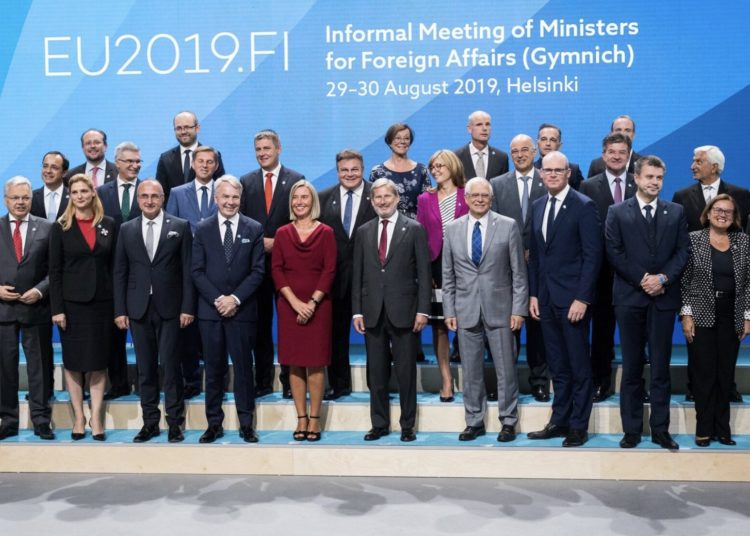Nordic Monitor
Following a decision of the European Council to impose sanctions on Turkey over drilling activities in the eastern Mediterranean, the EU did not invite Turkish Foreign Minister Mevlüt Çavuşoğlu to a recent informal gathering of EU foreign affairs ministers known as the Gymnich meeting at which other candidate countries were represented.
At the Gymnich meeting held in Helsinki on August 29-30, the foreign ministers of EU member states exchanged views on regional and international issues such as the situation in Syria, the fight against terrorism, Iran, the Arctic and hybrid threats. On the second day of the event regional cooperation was discussed with the participation of foreign ministers from candidate countries. The meeting was chaired by High Representative of the Union for Foreign Affairs and Security Policy Federica Mogherini.
Gymnich was the only remaining platform where Turkey was represented at the level of foreign minister among other candidate countries. However, Turkey was excluded from the Helsinki meeting despite the fact that it is one of the main actors in the current regional crises discussed during the event. The Turkish foreign minister had participated in several Gymnich meetings in the past upon the invitation of the high representative. The last meeting took place in Bucharest on January 31-February 1, 2019 and was attended by Çavuşoğlu.
However, Çavuşoğlu received no invitation for the Helsinki meeting. While the European foreign ministers were discussing important political issues at the Gymnich, the Turkish foreign minister was trying to convince an audience at the Norwegian Institute of International Affairs (NUPI) in Oslo that President Recep Tayyip Erdoğan is not an authoritarian leader.

In June 2018 the European Council declared that Turkey had moved further away from the EU, and its accession negotiations came to a standstill. Furthermore, the EU stopped working towards the modernization of the EU-Turkey customs union. Then the council decided in July 2019 to reduce its financial assistance to Turkey and halt high-level talks with the country as part of a set of sanctions over its drilling activities in disputed offshore territories in the eastern Mediterranean. The latest Gymnich meeting revealed the EU’s commitment to its sanctions on Turkey and that Turkey-EU bilateral relations would continue to be turbulent.
On July 15, 2019 the European Council called on Turkey to halt its drilling activities in the eastern Mediterranean and decided to suspend negotiations on the Comprehensive Air Transport Agreement and not to hold the Association Council and further meetings of the EU-Turkey high-level dialogue. In accordance with the council conclusion, pre-accession assistance to Turkey for 2020 will be reduced and the European Investment Bank will review its lending activities in Turkey.

According to most experts, the Turkish case will be the first failure in the history of EU enlargement. In May the European Commission released its 2019 Turkey report, which includes various figures supporting their arguments. The report underlines that there has been a serious backsliding in the fields of freedom of expression, human and fundamental rights and economy. With Erdogan’s crackdown on dissidents in the aftermath of a 2016 coup attempt and his sweeping new presidential powers, Turkey lacks checks and balances, the report said. Moreover, many European leaders go further and say Turkey no longer meets the democratic criteria to be a candidate for accession.
Gymnich is the name given to the informal biannual meeting hosted by the rotating presidency of the Council of the EU. The name comes from Gymnich Castle in the German town of Erftstadt, where the first such meeting took place. During the Gymnich meetings, the participants exchange views on regional and global developments concerning the EU.












